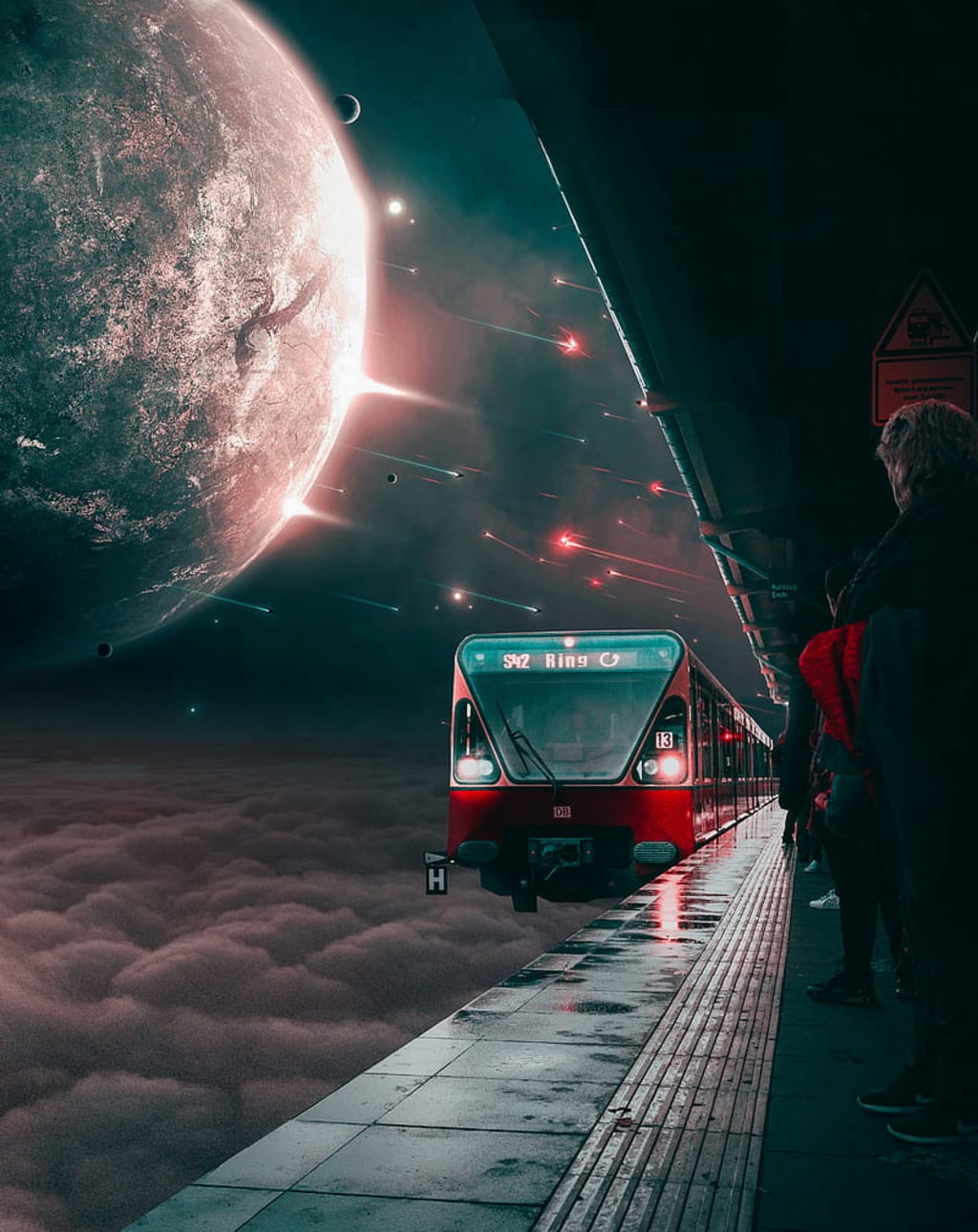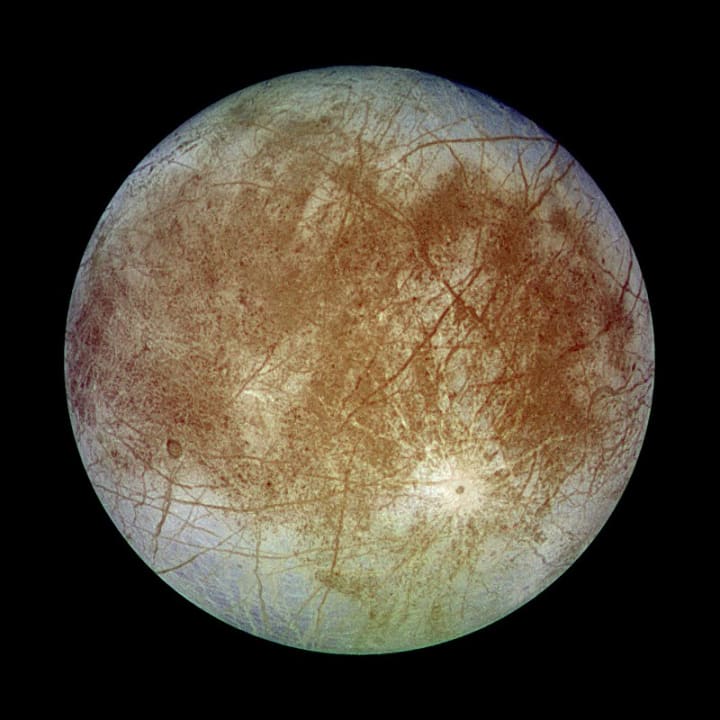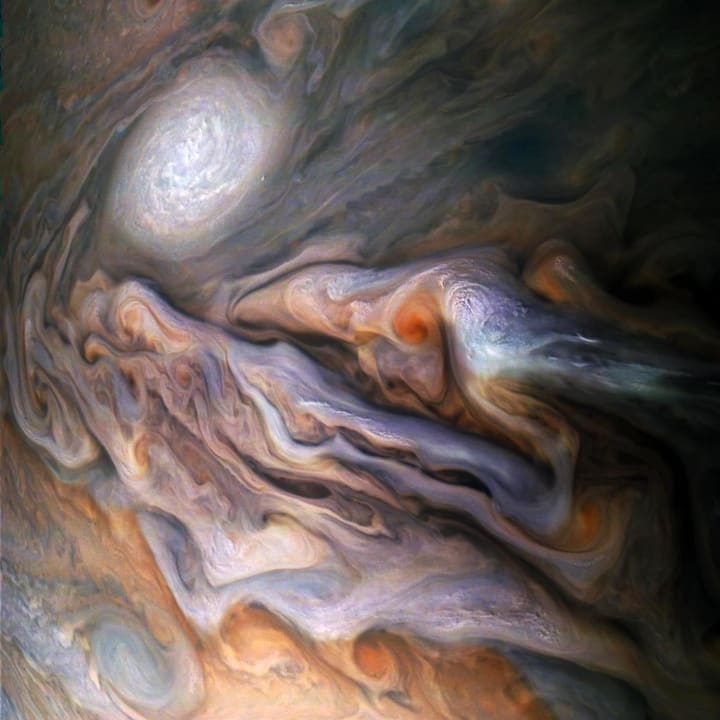
Nobody can hear a scream in the vacuum of space, or so they say. Sound travels through vibration in air particles that typically carry oxygen, and with space existing as a vacuum, sound becomes absent. Unless one were to carry radio device in ones' suit, you would not be able to hear your travel partner.
Everything is uncomfortable: the weather is 100 K freezing cold, ice droplets floating everywhere, and the sun is the smallest I’ve ever seen it. I considered the forthcoming lack of light exposure to be strenuous, but now I don’t think my eyes will be the same because of this journey. It took weeks before my pupils could finally adjust to the lack of light exposure on this forsaken moon, but the adjustment to the freezing temperament is simply impossible. My Extravehicular Mobility Suit (EMU) may be updated, completed with technology that can help keep me somewhat warm, but the suit is just not enough for a woman like me who was born and raised off the shores of the Equator. Honestly? Fuck this cold. As soon as I make it back to my home planet, I’m never stepping foot off of it again.
EMUs are a stark contrast to the suits provided during Mars’s pre-colonial stages. The elder suits took up way more mass that would frankly trigger my claustrophobia. Engineers and designers discovered a way to provide space travelers with their atmosphere requirements while keeping pressurized suits slim, our pressurized oxygen tank backpacks making up the weight in our ensemble, although extra padding is still provided in case of debris. After centuries of cultural events dedicated to the galactic frontier, engineers finally caught up with the fashion industry’s demands for a more marketable design for commercialized audiences. Space travelers often follow the seasonal trends presented on runways hosted on Biskante, Mars while science professionals generally stick with either uniforms provided at their place of occupancy or monochromatic color schemes. My suit, for example, is a monochromatic red to fit the logo colors of VZ, the leader of the organization that sent my team out to Mars.
VZ, also known as Vacuum Z, is the galactically renowned private organization that’s extended Earth’s railway systems to planets beyond. The organization works with various governments to monopolize these railway systems, their next project being Europa. Project XJ-13 is what they title our expedition project, and it’s expected to either continue as either the train station’s name or the city itself on Europa. The decision has yet to be announced. It turns out Mars wasn’t enough for our species. While marketing teams sway their audience to believe that the project’s purpose is to design a new city within our solar system, it's yet just another step to repeat history, at least it is in my eyes.
If I look down from the glass sides of the terminal, I can see my hydroponics farm at work on Europa’s glowing surface. I feel a bit of pride in my work knowing it’s taken enough mass to where it can be viewed from the Intergalactic Station; after all, terminals are typically a few atmospheric levels above the destinations to accommodate the fuel source that supplies such a transportation system. With that distance and lack of light exposure combined with Jupiter’s radiative effects, I’m surprised I can see any landscape, let alone my farms. The turbulent temperament and glossy domes prevent me from seeing anything beyond blotches of green, but the mass of the project I was last informed covers 665,400 mi², roughly the size of Alaska, US. A project that vast on such an icy surface was probably the most stressful I ever experienced in my life, but rest assured, thanks to the team I was given, I can leave this land confident in knowing I gave project XJ-13 a regenerative start. T-minus 2 hours until I’m on the way back home. Finally.
This isn’t exactly my first intergalactic train ride, but something about traveling to and from Lune to Europa, one of Saturn’s most glamorous moons, gave me the hope and possible expectations that the journey would be a wondrous sight to see, along with an impressive vehicle for transportation, but alas, the vehicle is just like any other mode of transportation: clunky and stale. The farther we were away from the sun the less we saw, and passing through the primary asteroid belt was worse than any turbulent winds on an airplane flight. I hoped we would at least witness new star formations with the new distance, possibly see the galaxy at a new angle, but it seems I’m as egocentric as every other member of my species, neglecting the fact that we’re only at the edge of the galaxy. It’s not that the views weren’t breathtaking, it’s just that the breathtaking views back home also supply me with fresher fruits and unlimited accommodations. Space is cool, but Earth is warm, gorgeous, filled with oxygen, and frankly underrated.
I can suddenly sense the vibration of hollow footsteps by another passenger from the other side of the terminal behind me. The station isn’t exactly populated; in fact it’s commonly deserted with the exception of the maintenance crew, so the sound of the steps feels incredibly loud. With humanity’s colonization of Europa still at its trial stages, this part of the solar system has yet to be commercialized. The house tracks near Mars, however, are a completely different experience, complete with a crowd as dense as Lagos, Nigeria. The population on Earth has dwindled immensely since humanity’s first launch to Mars, giving la Terre a chance to rejuvenate, however this goal has, as usual, been faced with obstacles to reach efficient goals.
I already knew from the sound of the hollow steps who the person was behind me. Living and working in the same isolated compound unit for over a year provides a living environment that educates you on various minuscule details of your coworkers, ranging from body languages to even the unique sounds they produce in contrast to others simply by their weight. The familiarity is similar to that of a child listening to their parents footsteps to avoid getting caught staying awake past bedtime hours. Within an ecosystem that works far differently from home, this awareness amplifies immensely, and astrophysicist Stella is no exception to this rule. She is the first person I met along this expedition, and it seems she will also be the last person I see.
I turn around to face the woman only to be reminded of our height difference, she being the shortest but only by a few inches. The polycarbonate plastic does not keep me from being able to see Stella’s large brown eyes from behind the helmet. Even with the lack of light exposure, her name prevails its reputation. After a wave hello, Stella takes off her helmet to reveal her long hair, as black as the void of space next to us, all tied up in one frantic bun above her head. Her tan skin has paled over time due to the lack of sunlight, but her melanin still prevails, reminding others that her complexion will remain far from ivory. Eyes with no creases smile towards me like a military spouse spotting their partner at the airport after returning from war.
“You know you can take your helmet off here, no?” she asks. When we first entered this atmosphere, allowing us to take off our helmets was not part of regulation, but thanks to Stella’s work throughout these months, the station has improved immensely in sealing the oxygen within the terminals. The baby hair on the edges of her hairline, unable to partake in her bun, bounce on her forehead as she speaks.
“I’d rather be as warm as possible,” I answer, still watching the ice particles float outside the terminal. My body may be covered by my EMU, but I still find myself having to hug myself to fight for warmth. It may just be a helmet, but every small bit of help I can get to stay warm helps.
“Understandable,” Stella says with a chuckle in her breath. “My upbringing may have built me up a tolerance, but it's hard to disagree with that sentiment without noticing the ice in the air.”
I remember the mountainous upbringing she’s referring to so clearly it was as if I grew up with her. Back when I first met the astrophysicist with a background in aeronautical engineering standing before me, we were in the camp base on the surface floor of Europa. We explorers typically introduce ourselves with our land of origin, planet being the first on the list. Despite being born on Mars, Stella was raised in a small village east of China after moving there as a young child. Her parents would later move her east in pursuit of an academic career in Beijing. Back in those cabins she would describe to me the enormously stoic Himalayas she would be able to see in the distance of that village.
She would later work at the National Astronomical Observatory of China in her spare time between her studies where she would find her scholastic calling, a passion easily noticeable during our time on this particular moon. What little free time we had she would use to find places to look up at the stars, either that or fill it by helping develop the train station. Every bit of Stella’s vague descriptions of her and her family’s background I remember all too well, for I’m still left with questions about her past I have yet to receive answers on. It was clear for me to see how China’s southeastern barren mountainous landscape paved the way for Stella’s heart to return to Mars. Sometimes it feels like even after she’s left Earth, she’s still looking to chase the stars even further.
I, however, am a woman of the Earth. Born in Libreville, Gabon, much of my childhood was spent running around the city with my mother before spending my teenage summers in grand parks like the Akanda National Park. Much of my travels on la Terre was within my home continent along with a short lived visitation to the Americas, so listening to Stella’s experiences of home was one of my more favorite pastimes. Hearing something so foreign yet so close to home reminded me of the biodiversity of our planet often. My love for the natural world would quickly lead my university studies to the world of Ecology, where much of my time was dedicated to the nature surrounding Libreville, including the Pongara National Park. How this education would later lead me to work for a privatized organization to where is probably the farthest place I or any person has ever been from home is beyond my understanding. Nonetheless, I find myself continuing to present organic, regenerative rhetoric to beings in authoritative power, hoping that at the very least we cushion the worst of outcomes of this galactic expansion.
“It's a shame. I was hoping to see your face one last time before we part ways,” Stella bargains with a tone much softer than her conversational introduction. Message definitely received.
“Will it not be warmer on the train, or are you scheduled at a different time than me?” I tease back. The chances of us running into each other in the train is more than likely in comparison to the slim chance of us seeing each other again once we leave that train.
“It might be in a few astronomical units away, but patience is a virtue I have yet to learn.” She may not always give the widest of facial expressions, but Stella’s tone always clarifies her intentions. “Maybe on the train we can discuss a few theories I’ve been running through up here,” she says pointing to her cranium. The chances of those thoughts regarding ideas to evolve the technology within the glass domes without threatening the efficiency of her agricultural system is very high.
My helmet keeps me looking stoic like all the astronauts of the past, which is a good thing, I believe. I like the power I gain from masking my face every now and then so people lose the desire to assume my emotions. While Stella’s face is often unreadable, my emotions are easily given away with my face. My mother always said I’d make a wonderful actress but a terrible poker player. “I’ll consider it in a few astronomical units, the closer we get to the sun the easier it is to see our faces after all.”
“You make a good point,” Stella laments, looking at her own helmet simultaneously. Before either of us could say more, a maintenance crew member arrives waving to Stella, looking no younger than his 50s. His suit is clunkier than ours, packed with several emergency supplies for assignments in his field so intricate that only an employee like him can fully understand how to use such items. All three suits, however, maintain the same color scheme, a bold red only ever interrupted by streaks of white from the padding. He waves to Stella in the distance within my peripheral vision, clearly too nervous to interrupt a conversation but urgent enough to request her presence.
Stella waves back to him before receiving another hand gesture that signals her the urgency of his awaiting conversation regarding her engineering duties. Before leaving, she turns her attention to me one last time. “I’ll be back before the train arrives, I believe I’m needed."
“With your craftsmanship? I feel safer already.” If there’s anything I learned about Stella during this expedition, it was that she was passionate about her field of study, and it was that passion that inspires me to push harder in my own field.
Stella’s first sharply emotional facial feature reveals rosy cheeks before turning her attention back to the elderly crew member. The two engineers leave the room together once she leaves our conversation to catch up to him, discussing their logistical matters, leaving me to bask in the view of the void yet again.

Europa: ranked the 6th closest moon in distance to Jupiter.
Even with the dimness of the sun’s light, I can still notice every detail of hydrogen, helium, and other gas clouds on the outer layer of the gas giant rotating and orbiting above me, as far as my naked eye can see. Despite sound not being a presence in space due to the lack of vibrations in the void, I still feel like I can hear aerial noises from the enormous celestial body, mainly due to the fatal winds that form Jupiter’s linear patterns of gas clouds. I don't hear it, I simply feel the hypothetical sounds on the other side. The intimidation I feel from this planet doesn’t come from its size but rather how quiet the planet’s power is displayed at such close distance from the terminal. I can still recall the few moments of free time I had on Europa’s surface when Stella would find me at just the right time to witness Jupiter’s red spot as it rotated into view. The two of us would run away during our short lived breaks simply to get to an area that provided the best field of vision. The gas giant’s large mass encompassing the majority of the terminal’s right window view almost serves as a reminder for the possible death awaiting on the other side of the outer surface level. The solar system’s sun can still be seen from this angle, but the sight of it is much smaller than back home and difficult to find at times when Jupiter blocks the way of the sunlight’s reach. Lunar eclipse is very common on this Moon. There is no green, just lack of light on one side and linear layers of brown and beige on the other.

On the other side of the terminal is a blanket of darkness, the deep void. The sensation of witnessing such darkness feels similar to that of a deep sea diver seeing the depths of the ocean, except the experience is closer to the sensation of falling into nothingness rather than sinking into escalating pressure. While divers’ risk death by suffocation, drowning into the salt water that creates such pressure, astronauts’ risk of death is somewhat of a reverse to suffocation, to the point where the water in one’s skin and blood vaporize just before the body’s lungs collapse, either that or the body would freeze to death. Saturn is the closest celestial object to be seen, only for it to seem like just another star. At times you would have a chance to gaze upon one of Jupiter’s other moons, however with the slothlike pace of both the planet and moons’ orbits, it would be an extraneous amount of time before running into such a celestial event. Sense of time warps the farther we distance ourselves from our sun. In a sense, to boldly go where no man has gone before often leads to moments of nothingness.
To look downward is to see Europa, the terminal’s main source of outside light beyond the dim sun. The radioactivity of Jupiter sends electrons onto Europa’s icy surface, creating a glowing effect throughout the night. Streaks of brown cross all over the planet like claws ripping into a blanket of snow, shining brighter than any star from where I stand. The nights spent on the moon felt like aquatic overnight raves without music, the land glowing in the dark from the energizing electrons providing heat to the underground water pathways. The first sight of green is my hydroponics farm. The biodiversity is blurred by the transparent chamber that shields the organisms from the harsh outside climate. Shield or caged? Not like I would be able to live here without it either. The biggest obstacle in my project was in fact radioactive energy on this land.
Home is hot, hotter than ever before, some argue the heat is as uncomfortable as Europa’s frost, but I beg to differ. Home may be a living hell, but our planet sustained these past hellish years because of the warrior children who continue to restore the land in regenerative ways. Many species are caged, in more ways than one, some caged by their own species. Inhabitants remain either to defend the homeland from complete exploitation or because there is not enough money to be able to escape to Mars. The rich may have fled to Mars but their presence still remains after they noticed our mother flourishing during their brief absence. Pirates have ascended to the Exosphere, interfering with commercial spacecraft so long as the military is not onboard. Home has new problems as well as old, I, nonetheless, aspire to walk along the defenders.
Terminal lights dim in comparison to the brightness of the moon, the space completely barren. Memories of home flood into my mind with every second passing by, remembering not only the warmth of my home planet but also the warmth of my family awaiting my return. In the darkness I currently reside in, I see the light that awaits before me. Seconds turn to minutes and minutes turn to hours. The terminal notifies me of yet another delay in my departure, and as frustrated as I am for this news, I lie down to rest simply because it was the main option for me. Rest becomes sleep and it’s only until I wake up did I realize how long I’ve slept. Most of the lights were shut down from the lack of activity within the terminal, and it was the approaching beam of light that awoke me when brushing past my helmet. The light was coming from down the railway tracks my train was to arrive from so I knew it was my queue to stand up. I have only ever arrived in the terminal once and never departed before, so the lights shutting down altogether became a signal for the train’s arrival for me. No trains other than Void Z trains run through this railway.
Oxygen, wind, void, all sporadically flush about with a light immensely, the brightness of the light prevailing against the radiating moon with every second of it encroaching. Some angles of the beam give off the sensation of a Pink Floyd album cover, possibly my favorite view from my trip thus far. Only a few moments later does a train as red as dried blood rush into the railway tracks before slowing to a complete stop. Void Z trains are red, but I’ve never seen one as crimson as the one before me. The doors slide open to reveal a blinding light that not even my helmet can block it enough to form a silhouette. This blinding light was nothing like my arrival onto this celestial body. The brightness was so immense I knew I wasn’t entirely awake until it started to shine upon me, so much so that it didn't register to me that I could suddenly hear the train's exhaust. It’s not like one can miss a Void Z departure in a place with only a departure hour per Jupiter day, and so — without a second thought — I step into the doorway entrance.
About the Creator
Meli Remborn
Travelling filmmaker with an appetite for new perspectives~
"I never paint dreams or nightmares. I paint my own reality" -Frida Kahlo
https://www.twitch.tv/vulgarg3nius






Comments
There are no comments for this story
Be the first to respond and start the conversation.